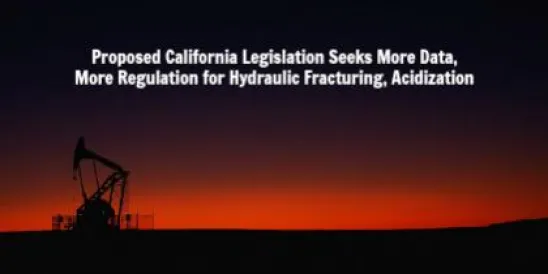The Pennsylvania Supreme Court on September 28, 2016, struck down as unconstitutional several remaining provisions of the controversial Act 13 of Feb. 14, 2012, P.L. 87 (“Act 13”), thus ending the General Assembly’s 2012 attempt to provide uniform laws and regulations governing oil and gas development in the Commonwealth. In 2013, the Supreme Court struck down the spacing and zoning portions of Act 13. See Robinson Township v. Commonwealth of Pennsylvania, 83 A.3d 901 (Pa. 2013). Now, the Court brings those challenges to Act 13 to a close by finding several remaining provisions relating to enforcement, confidentiality, private water wells, and storage to be unconstitutional or not severable from those provisions previously struck down in 2013. What largely remains of the statutory changes in Act 13 is the imposition of fees on unconventional gas wells, referred to as “impact fees,” a portion of which is distributed to local governments.
1. The Public Utility Commission and the Commonwealth Court No Longer Have Jurisdiction Over Challenges to Oil and Gas Regulations Enacted By Local Governments.
In 2013, the Court struck down as unconstitutional Sections 3303 and 3304 of Act 13. Section 3303 prohibited local governments “from enacting or enforcing environmental legislation regulating oil and gas operations.” Robinson Township v. Commonwealth of Pennsylvania, __ A.3d ___, J-34A-B-2016, at 8 (Pa. 2016). Section 3304 required that “all municipal ordinances regulating oil and gas operations be uniform, and mandated that certain drilling and ancillary activities attendant to the production of natural gas be allowed in every zoning district in a local political subdivision — existing zoning laws notwithstanding.” Id. at 9.
The Court now holds that Sections 3305 through 3309 cannot survive apart from Sections 3303 and 3304. Sections 3305 and 3306 permitted the Public Utility Commission (“PUC”) and the Commonwealth Court to decide whether a local ordinance violates the Municipal Planning Code (“MPC”) and provided procedures for the expedited review of local ordinances by the PUC and the Commonwealth Court at the request of oil and gas operators and others. Sections 3307 and 3308 penalized municipalities if local ordinances did not meet the requirements of the MPC. Section 3309 stated that Act 13 applied retroactively and gave municipalities a certain amount of time to take necessary actions to bring existing ordinances into compliance.
The Court noted that the policy behind Sections 3303 and 3304 was “to speed and simplify the local ordinance review process.” Id. at 48. With these sections already held to be unconstitutional, the Court found that “the legislature would not have passed . . . [Sections 3305 through 3309] into law merely to have the PUC and the Commonwealth Court engage in the same type of measured and deliberative review process for local ordinances which the MPC already provides.” Id.
2. Health Professionals are Not Subject to the Act’s Confidentiality Provisions.
The purpose of Sections 3222.1(b)(10) and (11) of Act 13 was “the maintenance of trade secret protections for the chemicals used in the fracking process by placing limits on disclosures of their identity by those in possession of such information” and specifically imposing certain confidentiality obligations on health care professionals that may be called upon to treat and diagnose those persons exposed to said chemicals. Id. at 52.
In addressing the constitutionality of Sections 3222.1(b)(10) and (11), the Court noted that “the pivotal consideration is whether these sections confer on the oil and gas industry, as a class, special treatment not afforded to any other class of industry, and whether this special treatment ‘rest[s] upon some ground of difference, which justifies the classification and has a fair and substantial relationship to the object of the legislation.’” Id. at 64 (citation omitted). In holding these provisions of Act 13 unconstitutional as special laws, the Court found no justifiable reason to allow the oil and gas industry special protections for its chemical trade secrets when there are numerous other Pennsylvania industries with similar types of concerns that are not granted such special treatment. Specifically, the Court noted that “no other industry in the Commonwealth has been statutorily shielded in this manner by the imposition of stringent limitations and conditions on the access to, and use by, health professionals of information pertaining to chemicals, substances, or materials used in its operations claimed to be trade secrets or confidential proprietary information.” Id.
3. Owners of Private Water Wells are Entitled to Notice.
Section 3218.1 “requires the DEP [Department of Environmental Protection], in the event of a spill of chemicals, waste, or other substances associated with the fracking process, to notify only public drinking water facilities that could be affected, but imposes no requirement for that agency to notify owners of private wells which supply drinking water.” Id. at 65. The Court considered whether this provision, much like the confidentiality provisions in Section 3222.1(b)(10) and (11), constituted a special law.
The Court first notes that Section 3218(a) requires any operator to repair or replace both private and public water supplies if they become polluted as a result of operations. Additionally, one clear purpose of Act 13 is “to secure the health, safety, and property rights for all Pennsylvania residents during the oil and gas extraction process, without exception.” Id. at 75 (emphasis in original). As such, the Court found Section 3218.1 unconstitutional as a special law since it “does not further the legislative goal of ensuring [private well owners] may exercise their right to have the integrity of their water supply secured in the event it is threatened by pollution from a spill.” Id. at 77.
The Court’s mandate as to Section 3218.1 is stayed for 180 days in order to allow the General Assembly the opportunity to revise the provision to include DEP notification to private well owners. If no action is taken by the General Assembly, then the entire provision will be stricken and the DEP will not be required to provide contamination notices to the owners of private or public water supplies.
4. Storage Provisions Constitute a Private Taking by Private Corporations.
Provided certain conditions are met, Section 3241 authorizes a private corporation to appropriate subterranean real property interests in order to store natural and manufactured gas. The Court found that this section violates the Constitutions of both the United States and Pennsylvania for two primary reasons.
First, the application of this provision is not limited to public utilities and applies to all corporations that are “empowered to transport, sell, or store natural gas or manufactured gas in this Commonwealth.” Id. at 85-86 (“Critically, then, Section 3241(a), by its terms, does not restrict the type of corporation eligible to take the subterranean lands of another property owner to only corporations that meet these specific legislatively imposed conditions for them to qualify for classification as public utilities.”). Second, the Court found that the public is not the primary and paramount beneficiary from any takings under this provision. Id. at 86 (“[Section 3241] advances the proposition that allowing such takings would somehow advance the development of infrastructure in the Commonwealth. Such a projected benefit is speculative, and, in any event, would be merely an incidental one and not the primary purpose for allowing these type of takings.”).





 />i
/>i

